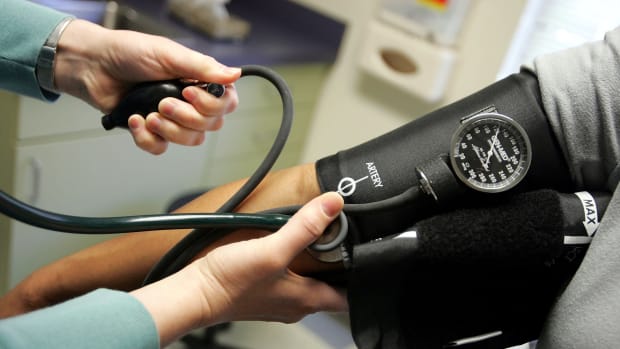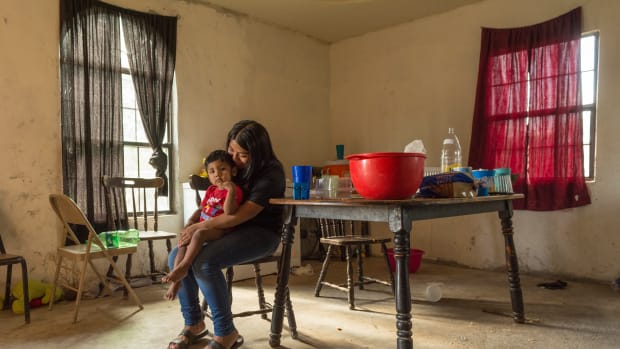A Conversation With 'Prescription Thugs' Director Chris Bell

Film director Chris Bell, right, pictured with his brother, Smelly, mother, and father. (Photo: Samuel Goldwyn Films)
America pops way too many pills. The number of prescription painkillers in the United States has nearly quadrupled since 1999, creating what the Centers for Disease Control and Prevention (CDC) is calling a prescription painkiller overdose epidemic. And yet, according to the new documentary Prescription Thugs, this national addiction isn't just medical—it's cultural.
Part journalistic investigation, part personal confession, the latest film from documentarian Chris Bell examines a national problem through his own family's story. In 2008, Bell's own brother, Mike, died at 37 years old, addicted to pills. Interweaving family footage with clips from pop culture, interviews with medical experts, and personal disclosures, the film makes the claim that Chris, his friends, and family were just as complicit in Mike's addiction as Big Pharma, advertisers, doctors, and other medical-industry players. "Ask yourself," Bell says at the beginning of the movie, "Is it really a War on Drugs, or are we just a nation of prescription thugs?"
We caught up with Bell last week to ask how he came to answer that question. Over the course of a wide-ranging conversation, Bell spoke about what it was like to interview friends about their drug problems, confessing his own addiction to his parents, and his relapse over the course of production.
You've previously directed documentaries about steroid-using bodybuilders and over-invested sports parents. What inspired you to take on prescription drug addiction?
Prescription drug addiction is pretty much a core part of my world. My older brother, who was in my first film Bigger Stronger Faster* [Mike Bell], passed away when he was 37, and prescription drugs had a lot to do with his death. Also, I had personal issues with prescription drugs myself. I wanted to find some answers.
Over the course of the film you're not only interviewing experts—researchers, authors, the founder of a famous rehab facility—but also your family and friends. Did the personal nature of the film make the production process especially challenging?
The challenging part was that this was a little more serious on my end: I had to tell my parents that I have a prescription-drug addiction problem.
Did you start the film intending to tell your parents, or did that emerge during production?
No. When I started the film, I was pretty much done with my own personal prescription drug usage—but as you know, these drugs are really powerful. A lot of times we feel like we need these drugs for a certain reason. For myself, if I was in pain, I needed a painkiller; if I had an anxiety issue, I needed Xanax. I had a couple of issues where I felt I needed Xanax and I went back on Craigslist to buy it.
I think my parents knew I had a problem with prescription medication, but they didn't say anything. A lot of times I think that's the biggest problem in this country: We don't communicate with each other. When we don't know what's going on with each other, we can't recognize when somebody is having a problem.
Did your research over the course of the film affect your recovery process?
The more I researched, I realized there were actually answers. I found that a lot of people who had it pretty bad had made a full recovery. So I thought, "Oh, wow, there's hope, and you can get out of this."
Several of your friends open up in the movie about their own problems with prescription drug addiction. It's one thing to open in confidence, but to open up in front of the camera, that's something else entirely. How did you get your friends to speak out?
If you get people to trust you, you can pretty much get them to tell you anything. I think that's good as long as you use what they're telling you for good. I'm not trying to hurt anybody, I'm just actually trying to find some answers, and come to a conclusion.
Most of the people in the film were people that I knew. I get a lot of journalists telling me: "I can't believe people just open up to you like that. I can never get anybody to open up like that—what's your secret?" The thing is, I don't have a secret. I've known these people for 20 years. I have resources that no journalist would ever have, because I've been in it myself. I'm not perfect, and I'm not trying to hide, and I'm not coming to tell on all these people. I'm one of them. The issue with steroids [in Bigger Stronger Faster*], that is right there in my family. This issue with prescription drugs, it's right in front of me. The issue with the trophy kids [in Trophy Kids], my best friend is a basketball coach, and he was going through that every day.
A lot of the things I focus on in my movies have personally affected me, or somebody that was close to me.
The title of the movie, Prescription Thugs, refers both to Big Pharma and to American consumers, among others. When did you land on the idea that there wasn't just one villain in this story?
Everyone's guilty. When you look at patients that are going to the doctors, they are oftentimes complicit in it—they're going and seeking drugs, or they're going to go along with [unnecessary prescriptions] because they kind of want to get drugs. Doctors are involved because they're the ones writing the prescriptions and getting some sort of kickback from the drug company. And of course the pharmaceutical companies that are making these drugs are there to make billions of dollars. The way to make billions of dollars is to make the drug, and build in the price of getting sued, along with the research and everything else, into it. Everybody on all levels, including the congressmen that are making the laws affecting drugs, is on the take in this issue. The only people who aren't on the take are the people who have had someone die. People like me. But we pale in comparison to the amount of dollars being poured in from Big Pharma.
Based on your research, are there are any promising policy fixes that could, if not solve this problem, help alleviate it?
This problem is man-made, and it's made right here. Opioid drugs—not opiates like morphine, but opioids like OxyContin or Percocet—are drugs that we actually make in this country. With synthetic drugs like those, we have the Drug Enforcement Agency tell the pharmaceutical companies how many drugs they're allowed to make. And we make way too many drugs. Say we needed a million pills; we're making 40 million. Why are we making so much more of the amount than we actually need? I think the best way to get rid of this problem is really just crack down on the amount of pills made. If there are fewer pills made, how are people going to take them?
That's the problem: We have to make enough pills to get rid of pain in this country—and we're never going to figure out exactly who's in pain and who's not, so you're always going to have people abusing the drugs. The best we can do is crack down on it. Try and make a reasonable assessment of how many drugs we actually need to make and how many people actually need them.
If manufacturers were to cut down on the number of drugs that were produced, would there have to be certain fixes to prevent people going cold turkey on certain drugs?
There are only certain drugs, like benzodiazepines and alcohol, that can kill you if you're in withdrawal. Withdrawal from painkillers can make you feel like you want to die, but you can't actually die from it. But you definitely don't want too many people stopping cold turkey, if only because it would create a lot of withdrawals and unnecessary problems.
There should be a way to get people who want help into a voluntary rehab situation. I always say rehab works because drug addiction is a behavioral problem. We habituate the things that make us feel good, and drug addiction is no different. It's actually a lot simpler than people think. When I was addicted to these pills, I thought I would have to do something crazy to get off of them. What I really had to do, though, was change my mindset. A big part of it was just not wanting to do drugs anymore. That's the biggest part of recovery, actually, the number one thing—just not wanting to do it.
I'm sure as you've been following, prescription drug abuse has become a political issue this election season. President Obama mentioned it in his State of the Union address, and Carly Fiorina and Jeb Bush have opened up about their own children's drug problems.
Obamacare is pretty ridiculous. We're making people buy health insurance and get involved in this system that is over-producing drugs. I think there's a lot of unnecessary prescriptions that are going to be written. I feel like this is going to cause more people to buy more drugs, and more people to become addicts. It's frustrating.
If President Obama's real mission is actually to have everyone be healthy, then we would start outlawing things that aren't good for you. We're not doing that. We're making sure everybody's protected, but not that everybody's taking the steps to actually be healthy.
Have you received any response from Big Pharma since the film premiered at the Tribeca Film Festival? You state in the film that they wouldn't talk to you during production, but have they reached out to you after?
I haven't had any feedback from Big Pharma. I don't think the film goes after Big Pharma, necessarily. I hope it's a pretty balanced mix of laying a little bit of the blame on everybody. Big Pharma does take a lot of the blame as far as seeking money goes, but if you follow that money chain, it leads to everybody. That money chain goes to the doctors, and to the consumers.
There are a lot of people who [abuse the system.] This is an everyday occurrence: You go to the doctors, you get your drug prescribed, and then you go to the pharmacy, pick up your drugs, make a phone call, and flip 'em—you turn around and sell them. I don't condone that at all, but that's what's going on. I saw it happen right in front of me for a while. Some of my best friends did that for a living, back when I was really deep into it. Now I look back at all that stuff and I really regret it. If I have any regrets, it's that I bought and sold [prescription drugs] on the black market. It was illegal and I could have hurt somebody.
What do you hope your viewers will take away from your film?
My hope isn't really for Big Pharma to shut down because we need 'em. We need drugs, we need people researching medicine, we don't want that to go away. My goal is for people to be educated.
The purpose for the film was fulfilled at a screening we had in the Bay Area. I had a friend go to the screening, and they went to the doctor the next day, and got prescribed something, and my friend actually told the doctor, "I don't think I need that," and proceeded to tell him why—and it was all stuff in my movie. And the doctor said: "You know what? You're probably better off with diet and exercise, I just always think people don't want to do that." That's what it comes down to—doctors kinda know. They should be telling us: "Hey, you know what, you probably shouldn't take that extra blood pressure medication. You know what you should do? You should probably start exercising, you should probably stop eating so bad." But nobody wants to hear that, so they stick to the script. It's what we're all conditioned to do: You walk into the doctor and tell them how you feel, and they write you a prescription without even telling you what's really going on.
One thing that I definitely want people to come away with is that, if they have a friend or a family member who they think has a problem with prescription drugs, they can talk about it. Because nobody talks about it. The really simple thing is just to bring it up—just ask them what they had prescribed, or talk to them about their latest doctor's visit. Bring up the problem they have, and see how the medication is treating that.
This interview has been edited for length and clarity.







